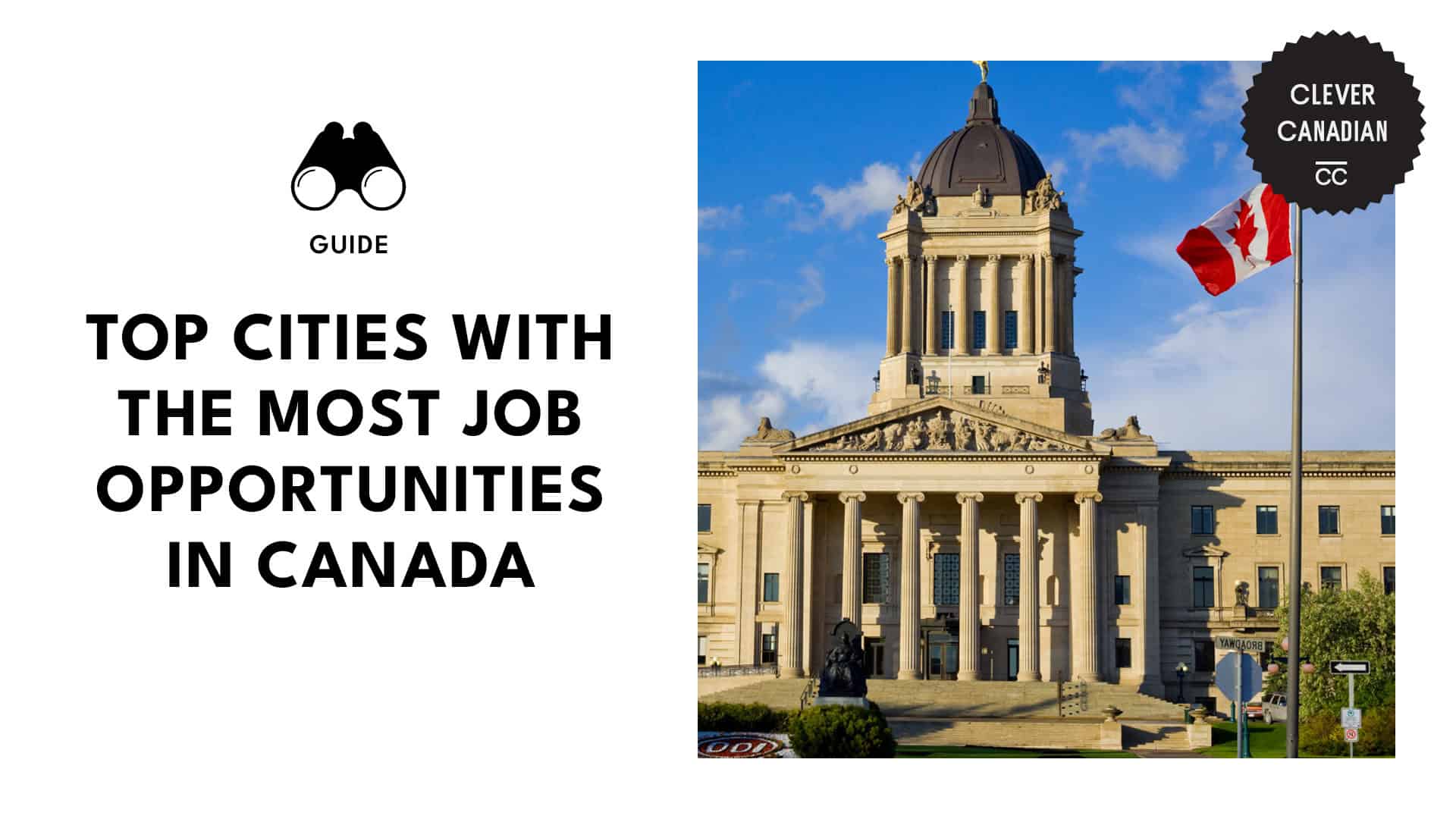Categories > Guides and Tips

Top 5 Cities With the Most Job Opportunities in Canada
- Which city is best to find a job in Canada?
- The 5 Best Canadian Cities for Finding a Job
- Toronto
- Vancouver
- Calgary
- Ottawa
- Montreal
- Benefits of Working in Canada
- Employment Laws and Regulations in Canada
- Immigration Requirements for Working in Canada
- Job Search Strategies for Finding Work in Canada
- Resources for Finding a Job in Canada
- Tax Landscape for Workers in Canada
- FAQs about the Best City to Find a Job in Canada
There are so many cities in Canada with great job opportunities, it can be tough to know where to begin. With a strong economy and a range of job opportunities, cities in Canada are sure to help you get your career off the ground.
But some cities stand out above the rest. So read on to know what these are and how it can help you in many ways.
Which city is best to find a job in Canada?
The five best cities in Canada to find a job are Toronto, Calgary, Ottawa, Vancouver and Montreal, as of 2023. Each of these cities has a lot to offer job seekers, from the finance industry, oil and gas industry to government jobs.
So no matter what your skills or interests are, there’s a good chance that you’ll be able to find a job in one of these five cities. Read further to know how these cities can help you find a job.

The 5 Best Canadian Cities for Finding a Job
If you’re looking for a job in Canada, then you should consider moving to one of these five cities. Each has a booming economy and offers a wide range of job opportunities.
1. Toronto

Toronto is a great choice if you’re looking for career opportunities in Canada. With the highest median hourly wage rate at $19 and the most jobs available with a total of 173,740 vacancies, it’s no wonder why Toronto is a popular choice for job-seekers.
| Toronto’s Median Hourly Wage Rate, 2023 |
It’s located in Ontario province, which has some of the highest median salaries in the country and one of the lowest unemployment rates which is 6.0.
Unfortunately, living and working in Toronto can be expensive since it’s one of Canada’s most populous cities. The cost of living is also much higher than other cities across the country—so keep this in mind if you plan on relocating here!
| Cost of Living in Toronto | |
| Category | Prices |
| Basic (Electricity, Heating, Cooling, Water, Garbage) | 176.91 C$ |
| Apartment (1 bedroom) in City Centre | 2,426.99 C$ |
| Apartment (1 bedroom) Outside of Centre | 2,029.65 C$ |
| Preschool (or Kindergarten), Full Day, Private, Monthly for 1 Child | 1,546.06 C$ |
| Taxi Start (Normal Tariff) | 4.41 C$ |
That said, Toronto’s diversity, amenities, and job market make it an excellent option for those looking to find a well-paying job in Canada.
2. Vancouver

Vancouver is known for its beautiful landscape, but it has a lot to offer those looking for a job in Canada.
The city is home to a wide range of industries, from healthcare and education to technology and finance, making it perfect for those of all backgrounds and abilities.
The cost of living in Vancouver is relatively high, but the median hourly wage is also one of the highest in the country at $26. Additionally, the unemployment rate is lower than average at 4.6%.
| Vancouver’s Median Hourly Wage Rate, 2023 |
| Cost of Living in Vancouver | |
| Category | Prices |
| Basic (Electricity, Heating, Cooling, Water, Garbage) | 125.01 C$ |
| Apartment (1 bedroom) in City Centre | 2,445.55 C$ |
| Apartment (1 bedroom) Outside of Centre | 2,085.71 C$ |
| Preschool (or Kindergarten), Full Day, Private, Monthly for 1 Child | 1,387.73 C$ |
| Taxi Start (Normal Tariff) | 3.75 C$ |
In total, there are around 93,000 jobs available in Vancouver at the moment. For those looking for more specific types of work—like marketing or finance—you’ll be happy to know that many employers are actively recruiting in these areas.
All-in-all, if you want plenty of job opportunities and don’t mind the high cost of living, Vancouver could be a great place for you!
3. Calgary

Calgary is one of the most popular cities in Canada for job opportunities, with a low unemployment rate of 7.2%. Not only that, but it boasts an impressive number of jobs to fill your time – a reported 186,500.
| Calgary’s Median Hourly Wage Rate, 2023 |
With a median hourly wage of around $33.10 and an overall cost of living that’s slightly more affordable than other cities on this list, Calgary just might be the place for you.
| Cost of Living in Calgary | |
| Category | Prices |
| Basic (Electricity, Heating, Cooling, Water, Garbage) | 288.12 C$ |
| Apartment (1 bedroom) in City Centre | 1,540.53 C$ |
| Apartment (1 bedroom) Outside of Centre | 1,287.50 C$ |
| Preschool (or Kindergarten), Full Day, Private, Monthly for 1 Child | 1,155.00 C$ |
| Taxi Start (Normal Tariff) | 4.50 C$ |
The city also offers tax incentives for businesses in several key areas such as tourism, health innovation and research, and green technology and energy – meaning there are plenty of markets worth exploring if you’re looking to get into the job market.
It’s also known for its flourishing arts scene and vibrant music scene—so if you’re looking to diversify your portfolio with something fun and creative this might be the place for you!
4. Ottawa

As the capital city of Canada, Ottawa is definitely one of the top cities to consider if you’re looking for job opportunities. With an unemployment rate of 4.9%, Ottawa’s job market is pretty competitive in comparison to its counterparts in the country.
Ottawa’s median hourly wages for full-time workers range from C$46.15. For entry level positions the starting salary is $83,642 per year.
| Ottawa’s Median Hourly Wage Rate, 2023 |
According to Statistics Canada, there are approximately 36,105 job openings in Ottawa. Another thing to be taken into consideration is Ottawa’s cost of living; it is cheaper than Toronto and Vancouver.
| Cost of Living in Ottawa | |
| Category | Prices |
| Basic (Electricity, Heating, Cooling, Water, Garbage) | 180.90 C$ |
| Apartment (1 bedroom) in City Centre | 1,736.79 C$ |
| Apartment (1 bedroom) Outside of Centre | 1,406.36 C$ |
| Preschool (or Kindergarten), Full Day, Private, Monthly for 1 Child | 1,412.50 C$ |
| Taxi Start (Normal Tariff) | 4.00 C$ |
This cost of living makes it a more appealing city if you are looking to start a new career somewhere with a lower cost but still plenty of opportunities —Ottawa is definitely worth considering!
5. Montreal

The sixth most populated city in Canada, Montreal is full of opportunity, especially if you speak both English and French. This city boasts a rapidly growing service sector and knowledge-based industries like artificial intelligence and video games.
| Montreal’s Median Hourly Wage Rate, 2023 |
Montreal has a median hourly wage of $20, and is known to have an abundant amount of job opportunities with a total of 74,240. On top of that, Montreal also has the fastest job growth rate in the country, with an unemployment rate of just under 4.3%.
The cost of living in Montreal can be quite expensive, so it’s important to factor that into your decision-making process. However, for those who find themselves living there and looking for work, Montreal could prove to be the ticket to success!
| Cost of Living in Montreal | |
| Category | Prices |
| Basic (Electricity, Heating, Cooling, Water, Garbage) | 106.99 C$ |
| Apartment (1 bedroom) in City Centre | 1,440.88 C$ |
| Apartment (1 bedroom) Outside of Centre | 1,101.28 C$ |
| Preschool (or Kindergarten), Full Day, Private, Monthly for 1 Child | 905.79 C$ |
| Taxi Start (Normal Tariff) | 4.10 C$ |
The educational opportunities are also top-notch—you’re likely to find one of Canada’s best universities here like McGill University or Concordia University. So if you’re looking for an exciting career and life experience, Montreal has unparalleled options.
Benefits of Working in Canada

When it comes to job opportunities, Canada is one of the best countries to consider. Not only are there lots of new jobs posted daily, but the country also boasts great benefits and conditions for workers.
Benefits of Working in Canada
Canada offers a secure and diverse work environment that provides job stability, friendly working culture and recognition of qualifications. The cost of living in Canadian cities is often less than what you’d pay in other places around the world.It’s easy to find part-time or freelance work if you need extra income.
The Canadian government also has several initiatives to help foreign workers settle into their new home quickly, such as educational programs for employment and language classes for those who don’t speak English or French.
It’s these types of benefits that make Canada one of the most attractive countries for job seekers from all over the world.
Employment Laws and Regulations in Canada

It’s no secret that Canada is a great place to find work. With its strong economy, diverse workforce and abundance of opportunity, Canada is a top destination for job seekers.
Whether you’re a recent graduate looking for your first job or an experienced professional seeking a new challenge, it’s important to familiarize yourself with the rules and regulations that apply to the Canadian workplace.
Each province and territory has its own employment standards, which set out the minimum rights and entitlements that employees are entitled to. These include things like minimum wage, overtime pay, vacation time and sick leave.
| Employment Laws in Canada | |
|---|---|
| Category | Description |
| Labour standards for interns | If you are under this category, you can have complete protections as an intern under Part III of the Canada Labour Code (Code). In addition, your internship has no minimum or maximum term and you will be paid at least the minimum salary. |
| Hours of work and Overtime | Whether you are a regular employee or a student intern, your standard hours of work is 8 hours per day and 40 hours in a week. Furthermore, when you work overtime, you are entitled to be paid at least 1.5 times of the regular hourly wage. |
| Minimum Wage | The federal minimum wage declared in Canada is 15 C$ per hour whether as a regular employee or intern. |
| Deductions | Like with any other work rules, your employer has the right to make certain deductions from your salary. This includes: Taxes or Employment InsuranceChild support payment (if needed)Union duesAny overpaid wages |
| Vacation and general holidays | As a regular employee, you can be entitled to the following: at least 2 weeks of vacation annually (within 1 year of being employed in the company)at least 3 weeks of vacation annually (with 5 consecutive years of working with the same company)at least 4 weeks of vacation annually (with 10 consecutive years of working with the same company) |
| Flexible work arrangements | This kind of work arrangements covers: the location of work, such as working from home or a satellite locationthe scheduling of work hours, such as modified work schedules or split work shiftsthe number of work hours, such as part time, job shares, reduced hours Note: Only those who have been employed continuously for at least 6 months are eligible for this work arrangement. |
Employers must comply with these standards, and employees have the right to expect these benefits from their employer.
Immigration Requirements for Working in Canada

It’s important to familiarize yourself with the immigration requirements, which can vary depending on the province. The province or territory might also require additional documents depending on your country of origin.
Immigration Requirements
Generally speaking, when migrating in Canada you’ll need:
A valid passport.
• A valid visa or permanent residency status.
• Your language test results.
• A job offer or contract with your employer.
• Proof of your funds.
You can also look into the Canadian Experience Class (CEC) program by Immigration, Refugees and Citizenship Canada. This program is for foreign nationals who already have experience working in Canada temporarily and wish to stay permanently.
To qualify, you’ll need to meet certain language proficiency requirements and accumulate at least one year of full-time skilled work experience in Canada.
Other Canadian Experience Class Requirements
In order to count your 12-months of Canadian work experience towards your CEC application, it must meet the following conditions:
• It must be obtained in Canada within the 36 months before the date of submission of the electronic Application for Permanent Residence (eAPR).
• Your employment duties in Canada must fall under the NOC Code Skill Level 0, A, or B.
• Be lawfully obtained, paid work experience in Canada.
It’s always important to do your research when looking for job opportunities in Canada so that you can make an informed decision!
Job Search Strategies for Finding Work in Canada

When it comes to finding work in Canada, the job search strategies you should be employing will depend on what type of job you’re looking for.
For example, if you’re looking for a white-collar position such as management or engineering, you’ll want to look into LinkedIn and other similar sites, as well as traditional job boards.
| Two Classifications of Jobs in Canada | |
|---|---|
| White-collar jobs | The jobs under this class requires bachelor’s degree such as: • Accountant • Civil Engineer • Executive Director • Software Developer • Market Researcher • Management Consultant |
| Blue-collar jobs | The jobs under this class requires a specialized skills such as: • Farmer • Warehouse Associate • Construction Worker • Landscaper • Plumber • Auto Mechanic |
However, if you’re looking for something more manual or blue-collar, your best bet is to reach out to the companies that are hiring directly. This is a great way as companies often prefer hiring individuals who have expressed interest by making direct contact.
Finally, don’t forget about networking! Talking to people in your field who may know of job openings or be able to provide references is always a great way to increase your chances of success.
Attend conferences or industry events related to your field and use networking apps like Meetup or online groups like Facebook groups.
Resources for Finding a Job in Canada

Finding a job can be tough, so it’s important to know how to prepare before launching a job hunt. Depending on the city and industry you’re looking in, there are myriad sources and tools that can help you search for the right opportunity.
For Canadian job seekers, one of the most popular resources is Service Canada’s Job Bank website. The site is free to use and provides helpful information about jobs in almost all industries.
There are also posting boards that you can use to create your own profile and search for jobs as well as be found by recruiters or employers. LinkedIn is another great resource for searching for job opportunities.
| Platforms Where You Can Search for a Job | |
|---|---|
| • Robert Half • CareerBuilder • Jobboom • Simply Hired • ZipRecruiter | • Adecco Canada • Talent • Indeed Canada • Eluta • Government of Canada Job Bank |
With over 660 million users worldwide, it’s one of the fastest-growing professional networking sites and a great way to connect with professionals in your chosen field and increase your chances of finding a job.
Tax Landscape for Workers in Canada

When you’re looking for a job in Canada, it’s important to look into the taxes in that city. Every province and territory has their own tax rates, so it’s important to check out the tax brackets before deciding which city to move to.
In Canada, there are five different tax brackets depending on your income level. Some cities also offer rebates or exemptions depending on things like your marital status and number of children you have.
| Federal Income Tax in Canada | |
|---|---|
| Income tax brackets | Rates |
| $50,197 or less | 15% |
| $50,197 to $100,392 | 20.5% |
| $100,392 to $155,625 | 26% |
| $155,625 to $221,708 | 29% |
| More than $221,708 | 33% |
You can find this info online or through local government resources. It’s also important to note that the amount of tax you have to pay is dependent on two things: how much money you make, and where you live.
So if you’re making a lot of money and living in a city with high taxes, then more of your paycheck will be going towards taxes. But if you’re making less money and live in a city with low taxes, then less of your paycheck will be taken away from taxes!






